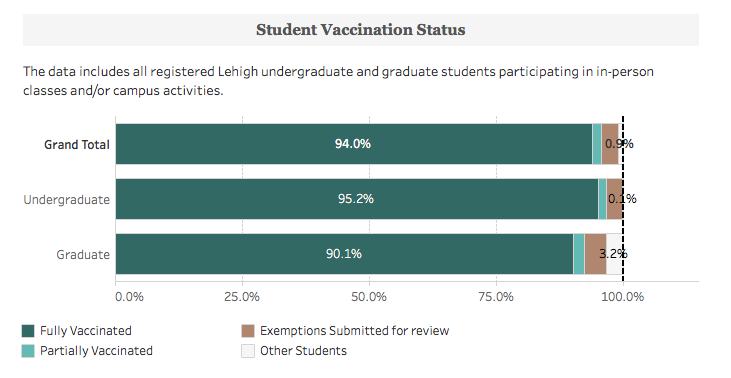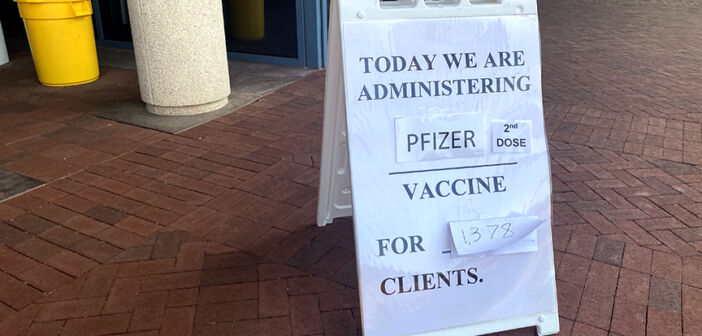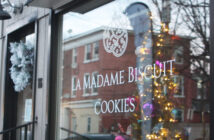Students, faculty and staff have two avenues for receiving exemptions from the COVID-19 vaccine mandate: make a case of either religious or medical incompatibility. After providing documentation and going through a committee review, the request is approved or denied.
According to Lehigh’s COVID-19 dashboard, as of Sept. 1, 3.4 percent of students, including graduate and undergraduate students, have submitted exemptions for review.
Lori Friedman, Lehigh’s director of media relations, spoke with The Brown and White over email about vaccine requirements.
Political and social debates surrounding the vaccine and its credibility have transpired throughout every stage of the pandemic. Social or political beliefs are not grounds at Lehigh for an exemption, Friedman said.
If a student is unvaccinated without an exemption, they are blocked from enrolling at Lehigh, Friedman said. Unvaccinated faculty and staff cannot enter campus buildings without an approved exemption, she said.
Those with approved exemptions are required to undergo surveillance testing, complete daily self-assessments and must quarantine if identified as a close contact for a positive case, Friedman said.
Medical exemption requests are reviewed by the Health and Wellness Center, Freidman said. Individuals must provide a letter from their treating health provider documenting the reason for exemption.
Kevin Vrablik, MD, MPH, chief of the Division of Occupational Medicine at Lehigh Valley Health Network, said if someone has an allergy to any of the components of the vaccine or an allergy to the vaccine itself after they received it, those circumstances could be cause for a medical exemption.
He said these cases are rare.
“Here at the network I could count on one hand how many people so far that we know of that actually have an allergy to the components of the vaccine or the actual vaccine itself,” Vrablik said.
Those demonstrating religious beliefs against vaccination also had to provide a personal statement, including any supporting documentation of their belief and indicate whether other immunizations required by the school were against their religious beliefs or if it just applied to the COVID-19 vaccine, Friedman said.
Lloyd Steffen, University Chaplain and professor of Religious Studies, said some religious people hold beliefs about what medical interventions are appropriate in association with their religion.
“The beliefs they hold may pertain to purity and impurity and what can be put into the body, or even about whether doctors as human agents should be doing the work of protecting a person,” Lloyd said. “Some religious people believe that God will protect them without added medical assistance, and they furthermore believe that their faith requires them to put their trust in God and not in the work of medical science and physicians.”
Steffen said there are certain religions that would prohibit the use of vaccines and other forms of medical intervention. He said one may be members of Christian Science, who might object even though there is no Church-wide mandate on vaccines.
Dena Davis, professor of Religious Studies, said when a religious exemption is offered, problems arise.
“You’re dangling a privilege some people want: the privilege not to get vaccinated in this case… you may get a whole lot of people who are claiming that exemption were not really entitled to it,” she said. “If it’s a few people, what the heck, right, but if it becomes a really big problem, then how do you police that?”
Davis said at age 16, she cited religious reasons to get out of a Saturday class, even though the reasoning was a stretch from the reality of her secular Jewish household.
“Now, I’m really embarrassed about this, but I got away with it,” Davis said. “What was she going to do? Ask me to recite a prayer in Hebrew?”
The religious exemption requests for the semester were reviewed by the Religious Exemption Request Review Committee, made up of staff from Student Affairs, the Chaplain’s Office and the Equal Opportunity Compliance Coordinator, Friedman said. This committee was created specifically to handle COVID-19 exemptions.
The Religious Exemption Committee members vary depending on whether it is a student or employee in question.
Steffen said that when it comes to documentation of belief, “showing that the religion itself prohibits certain kinds of actions, such as military service, provides support and explanation for an appeal to religion as a reason for seeking exemption.”
Amy White, associate director of media relations, said some examples of documentation may include: personalized letters from a religious figure, general statements from a religious organization about its position on the vaccines and articles about the religion or statements from individuals the applicant believes supports their requests.
White said in some cases religious exemption requests were denied when they did not provide the requested information, failed to explain that the vaccine was against their religious beliefs/failed to identify those religious beliefs, or based their case on social, political, and economic beliefs and philosophies, medical concerns, or personal preferences.
“One must assume that a person who is denied an exemption has failed in some way to demonstrate a sincerely held religious belief. Perhaps that person did not focus on religious reasons, or didn’t provide an adequate explanation as to how their religious belief amounted to a religious prohibition on receiving a vaccine,” Steffen said
Students whose requests were denied had to schedule their first dose within seven days of receiving the school decision, White said.
The deadline for faculty and staff to show they are fully vaccinated, in the process or apply for an exemption was Aug. 30.






Comment policy
Comments posted to The Brown and White website are reviewed by a moderator before being approved. Incendiary speech or harassing language, including comments targeted at individuals, may be deemed unacceptable and not published. Spam and other soliciting will also be declined.
The Brown and White also reserves the right to not publish entirely anonymous comments.